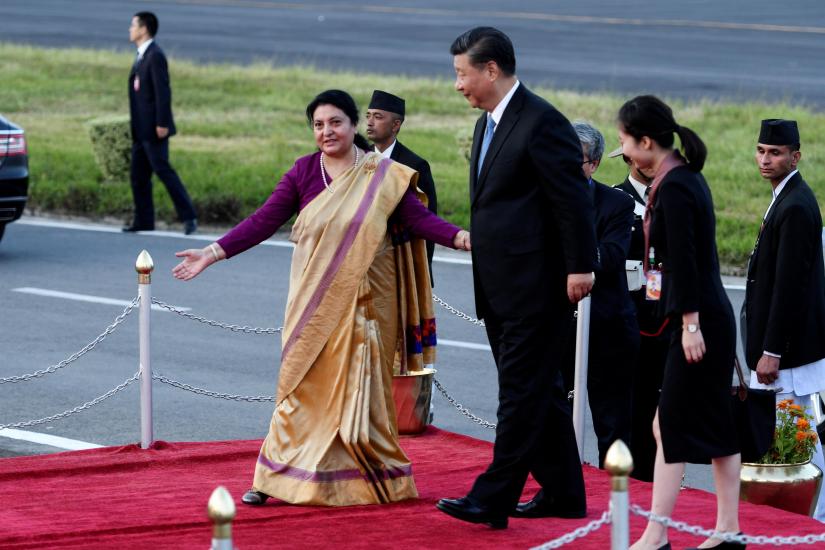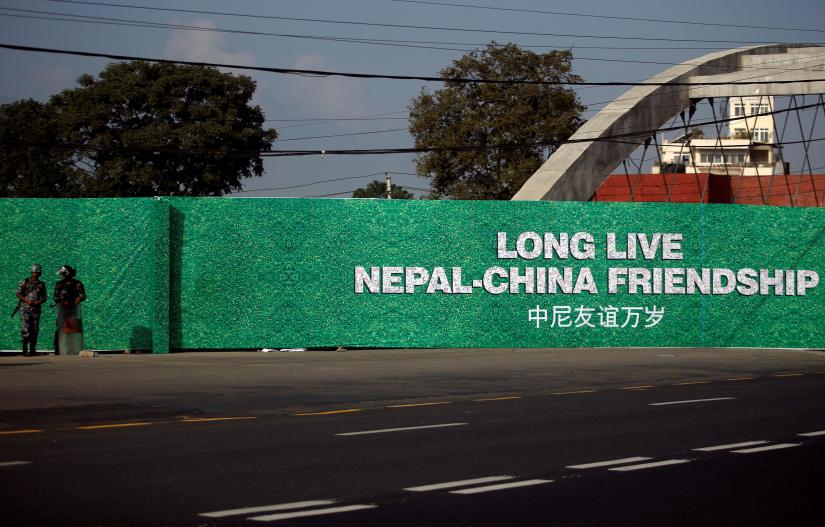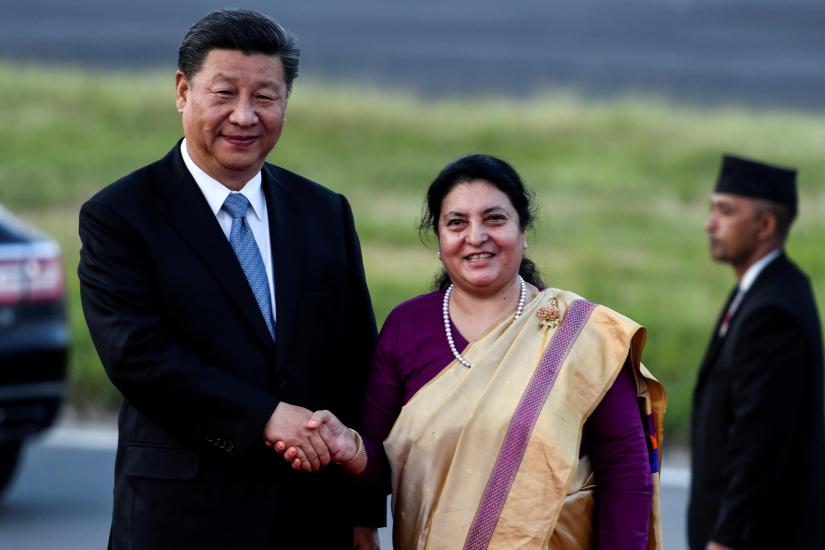Little did Nepalese leaders know what awaited them, when they opted some time ago to cosy up diplomatically to China, to fulfill several objectives---namely, to accelerate economic development, open up alternate trade/business routes to the North and to teach India a lesson. The diplomatic shift made sense. There was widespread anger against India for a crippling blockade imposed on Nepal, as it resisted alleged Indian interference in its plans to redraft its Constitution. There were other India-related irritants too. However, now the same leaders are wondering whether their choice has landed them from frying pan into the fire.
However, now the same leaders are wondering whether their choice has landed them from frying pan into the fire.
Nepalese law enforcing authorities are at their wits’ end trying to contain a massive crime wave sweeping their country in direct proportion to the increasing domination of the Chinese in the country’s social landscape. Already in top administrative circles in Nepal, there’s growing buzz that China presents a greater menace, measured in terms of its trouble-making potential. This makes his tenure distinctly uncomfortable for present Prime Minister KP Sharma Oli, long known for his pro-China slant.
Already a reaction has set in and a course correction by Kathmandu is under way. Nepal is going slow on implementing previously agreed proposals for building border roads, inking a bilateral extradition treaty (primarily aimed at marginalizing Tibetan refugees further) and concluding a defence pact with China. Leaders are reassessing security and other implications. This comes after 18 pacts had been finalsed bilaterally. Also on hold is the proposal to build a new Parliament house with China’s help.
Initially Kathmandu’s eager outreach to woo China has started to pay off. During the last 5 years, the Chinese brought big ticket investments to the landlocked south Asian Himalayan nation. Presently, there is a dominating Chinese economic presence, following top level bilateral visits, meetings and agreements. Chinese firms are engaged in major projects involving road building, new power plants and hospitals. An ambitious railway linkage between Lhasa and Kathmandu is also on the cards. Nepalese leaders saw in all this a win-win situation, as China provided the much needed capital, manpower and expertise.
By way of a payback, Kathmandu had to tighten the screws further on the few liberties enjoyed by Tibetan refugees, not allowed to hold even routine anti-China demos or go anywhere near the Chinese embassy. Snubbing India was also mandatory. Telling India to mind its own business was a long cherished dream in Kathmandu. The ‘Do not interefere’ message was duly given to India during Delhi’s efforts to monopolise relief, rescue and rehab work after the devastating Nepal earthquake. Nepal’s protest against the inclusion of the Kalapani area as part of India in Indian maps is another recent irritant.
Nepal’s overtures to Beijing secured a massive immediate payback in its tourism sector. During the past 12 months, 134,000 Chinese tourists have visited Nepal, the highest among all comers. The figure represents an increase of over 9% on a y-o-y basis. Nepalese bar/hotel/restaurant owners, travel operators and staff all rejoiced to see their cash registers ringing, their rooms at full occupancy!
So far so good, but gradually socio-economic problems started developing in Nepal, problems that were deeply rooted in the great economic differences between the two countries. What had happened in Myanmar over a long period is being reprised all too quickly in Nepal: people are getting angry with the Chinese because of their uncouthness and criminal activities.
As the smaller beneficiary in their bilateral relationship, Nepal cannot seriously punish Chinese criminals. The larger country invariably insists on recalling its criminals home even if they are caught committing serious crimes in Nepal. The sad if humiliating, truth is that no Chinese will ever be subjected to Nepalese justice, which offends the dignity of a proud race known universally for its fighting prowess! Nepal survives on its income from tourism. A single order from Beijing may stop Chinese visitors from coming in and end the happy carnival for the local economy! Tourist operators in Nepal are upset over the cliquish ways of many Chinese tourists. Some are bullies, according to allegations made by some social and womens’ organisations, to the Nepalese media. Most Chinese, usually tech savvy, hang around in groups when staying at hotels. They can afford to rent better residential units from private owners, thanks to their fatter wallets.
Tourist operators in Nepal are upset over the cliquish ways of many Chinese tourists. Some are bullies, according to allegations made by some social and womens’ organisations, to the Nepalese media. Most Chinese, usually tech savvy, hang around in groups when staying at hotels. They can afford to rent better residential units from private owners, thanks to their fatter wallets.
What proves difficult for a small developing country like Nepal, is its lack of an efficient crime prevention mechanism when it comes to dealing with sophisticated foreign criminals. Only weeks ago, Neplease police arrested 122 Chinese persons including women, for their alleged involvement in major cyber crimes all over their country. But the tip -off significantly came from the Interpol.
They were involved in swindling the Nepalese financial authorities and system of over 34 million Nepalese rupees over a period of time. Media reports say the police seized 747 mobiles, 331 laptops, 18 CPUs, 19 monitors 22 pendrives and 327 SIM cards, along with their passports. Intriguingly, only 67 of the lot had passports. How had the rest managed to enter the former Himalayan kingdom remains a mystery. Their main objective was to hack major official Nepali websites.
While this was big news in Nepal, such arrest of Chinese criminals apparently are not uncommon in other nearby Asian countries. Altogether 342 Chinese were arrested in the Philippines. Another 150 were arrested and then deported by Cambodian authorities some time ago. It is also assumed that some of those arrested in Nepal could somehow have come over from Cambodia.
Such reports of major illegal activities by the Chinese, raise the question: how serious is Beijing, in its efforts to rein in and check the mischief of some of its citizens, whether in Nepal, Cambodia, Philippines or elsewhere?
Following public protests in Myanmar over some Chinese infra projects, there is a similar trend developing in Nepal, over the building of a proposed Dam with Chinese help at the Sankhuasabha area. Media reports quote the MP representing the area, Rajendra Gautam, as saying that it may lead to flooding in Nepal. There are also complaints regarding the increased flooding in recent times in province 1 and 2 areas, thanks to new Chinese hydro power projects in the region, especially during the monsoon.
Interestingly, influential Chinese media like the Global Times report such matters from a different perspective. Foreign office spokesman Geng Shuang recently told media in Beijing that people arrested in Nepal were rounded up during a ‘ joint raid’ conducted by Chinese and Nepalese authorities. There was ‘effective coordination between the law enforcing agencies’ of the two countries. The level of co-operation would be raised in the future to deal with the all forms of crime, etc.
Meanwhile, as the Chinese embassy in Kathmandu pressed for the immediate handover of the 122 arrested people, Nepalese authorities freed them after fining them Rs 1,000 (Nepal) each! The low quantum of punishment angered locals.
Earlier, in July/Aug last year, five Chinese were arrested for tampering with ATMs and robbing local banks of Rs (N) 120 million. They had ‘infiltrated’ into the system operated by the Nepal Electronic System (NEPS) authorities. They too were repatriated to China. The catalogue of crimes does not end here. Ten persons including four Chinese men were arrested recently in connexion with a women trafficking racket. Two of the Chinese men had married local Nepali girls. Local investigators said that relatively poor, young girls were presented to Chinese ‘brigdegrooms’ from Kashi, Chitwan, Sunasaru and Lajung areas. They were married off after being trained to acquire social graces at a centre at Tokha. In China, these girls were allegedly used in various sex rackets. Local operators were paid as much as 1 million rupees (N) by the Chinese, according to reports.
The catalogue of crimes does not end here. Ten persons including four Chinese men were arrested recently in connexion with a women trafficking racket. Two of the Chinese men had married local Nepali girls. Local investigators said that relatively poor, young girls were presented to Chinese ‘brigdegrooms’ from Kashi, Chitwan, Sunasaru and Lajung areas. They were married off after being trained to acquire social graces at a centre at Tokha. In China, these girls were allegedly used in various sex rackets. Local operators were paid as much as 1 million rupees (N) by the Chinese, according to reports.
On a different note, after the US and Europe, it is the turn of Nepal to protest against the activities of the major Huawei company, believed to have hacked into several Nepalese websites and communication networks. There were angry demonstrations by the people against Huawei and some tried to enter forcibly into its local office. Five were arrested. Apparently, ‘corrupt’ Nepal telecom authorities sold the 4G network space to the Chinese company for which there were no bids.
Commenting on these trends, Charubrata Ray, Kolkata-based analyst, says, ‘People are aware of the hated ‘ugly American ‘of the pre Viet Nam war times, universally despised for clandestine US operations in various countries. However, their business was political domination. Unless the Chinese are more careful about their image projection, they could end up being painted as the ugly Chinese in Asia ----- worse, they would be seen as ordinary criminals, not politicos!’
 International
International
41414 hour(s) 7 minute(s) ago ;
Morning 09:01 ; Tuesday ; Jul 08, 2025
Nepal paying price for Chinese help
Send
Ashis Biswas, Kolkata
Published : 23:20, Jan 13, 2020 | Updated : 08:25, Jan 14, 2020
Published : 23:20, Jan 13, 2020 | Updated : 08:25, Jan 14, 2020
0 ...0 ...
/pdn/hb/
Topics: Top Stories
- KOICA donates medical supplies to BSMMU
- 5 more flights to take back British nationals to London
- Covid19: Rajarbagh, Mohammadpur worst affected
- Momen joins UN solidarity song over COVID-19 combat
- Covid-19: OIC to hold special meeting
- WFP begins food distribution in Cox’s Bazar
- WFP begins food distribution in Cox’s Bazar
- 290 return home to Australia
- Third charter flight for US citizens to return home
- Dhaka proposes to postpone D8 Summit
Unauthorized use of news, image, information, etc published by Bangla Tribune is punishable by copyright law. Appropriate legal steps will be taken by the management against any person or body that infringes those laws.
Bangla Tribune is one of the most revered online newspapers in Bangladesh, due to its reputation of neutral coverage and incisive analysis.
F R Tower, 8/C Panthapath, Shukrabad, Dhaka-1207 | Phone: 58151324; 58151326, Fax: 58151329 | Mob: 01730794527, 01730794528


